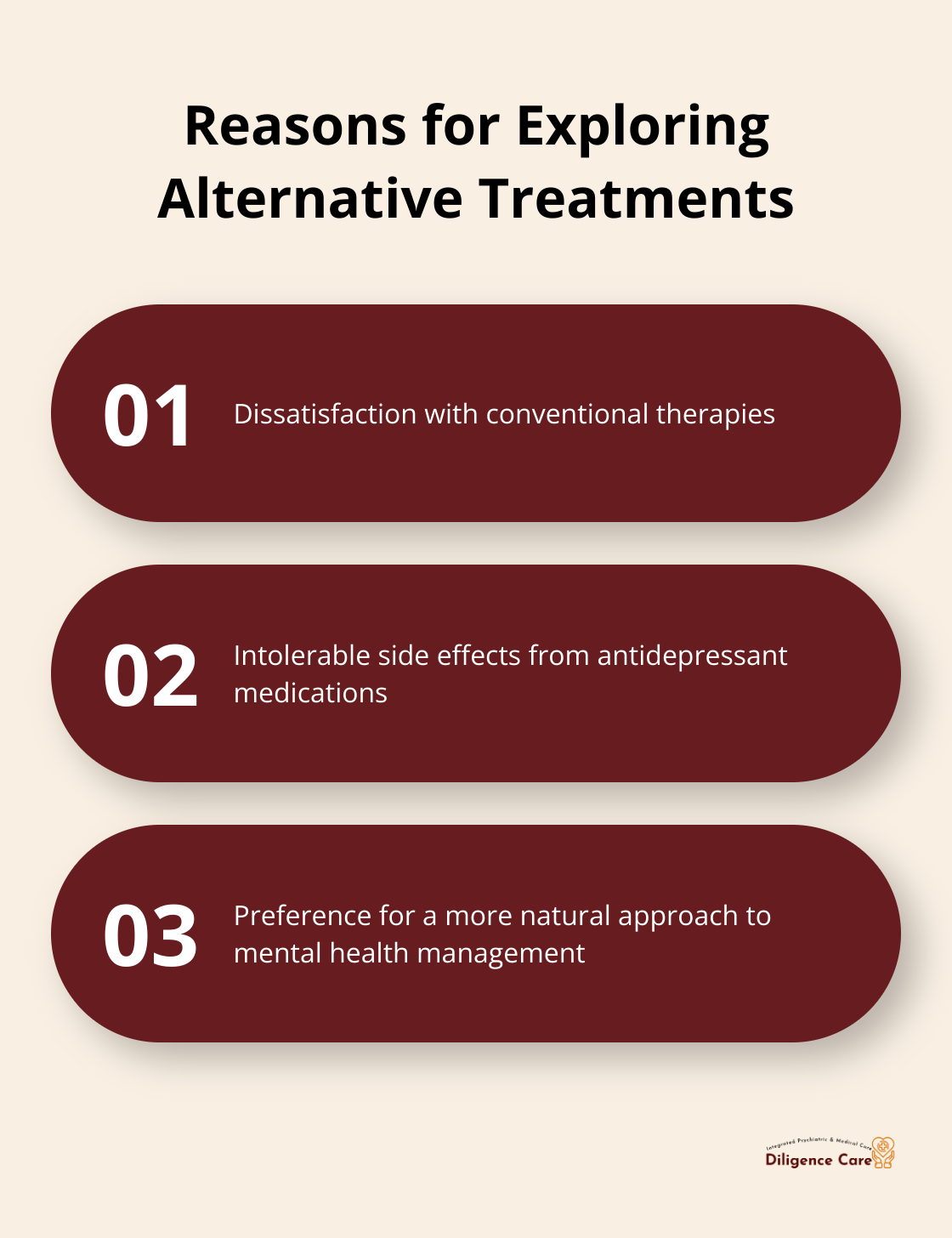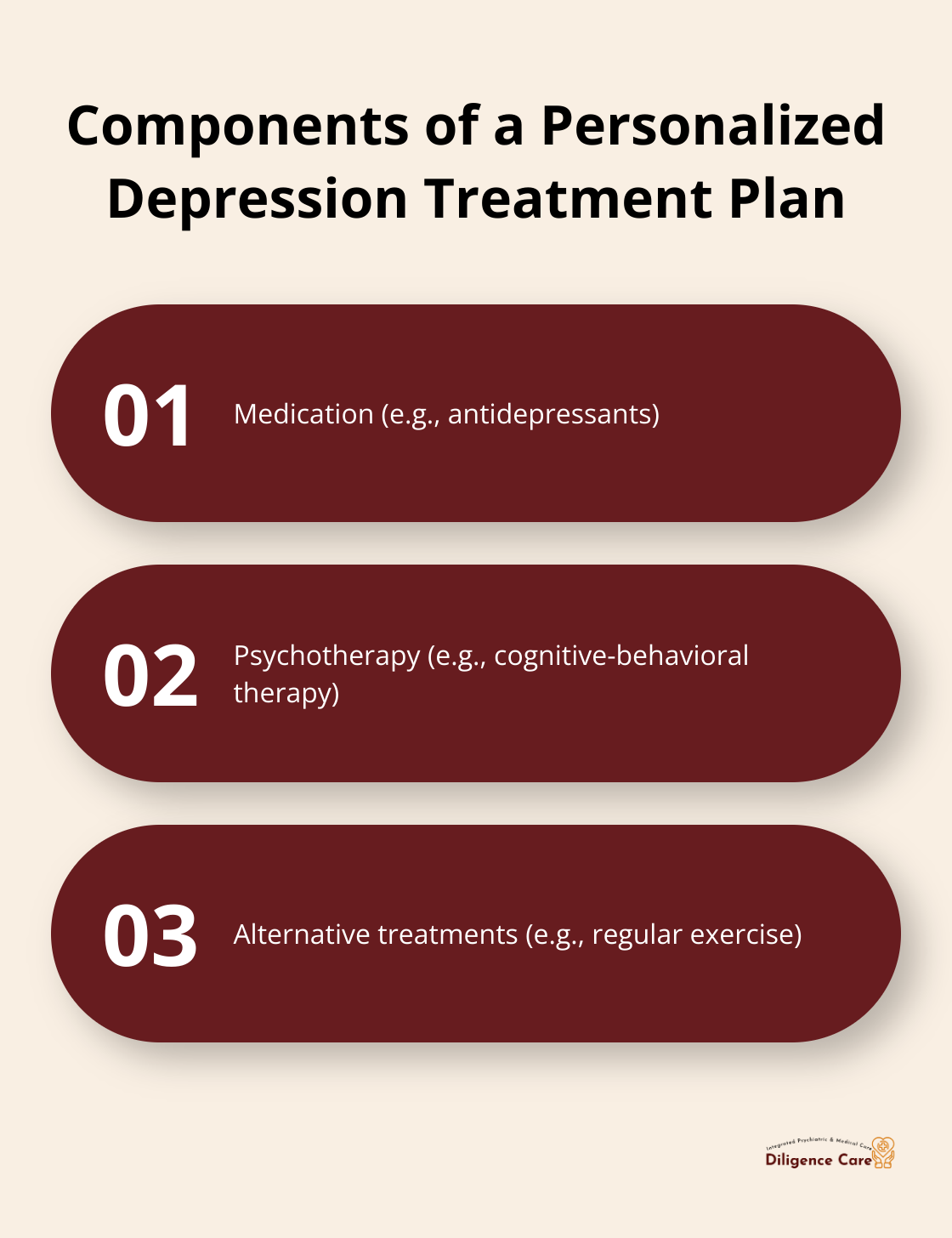
Exploring Alternative Treatments for Depression
Depression affects millions worldwide, and many seek alternative treatments for relief. At Diligence Integrated Care, we understand the importance of exploring diverse approaches to mental health.
This blog post examines promising alternative treatments for depression, from exercise and mindfulness to herbal remedies and light therapy. We’ll also discuss how to integrate these options with conventional therapies for a comprehensive approach to mental wellness.
Understanding Alternative Treatments for Depression
Depression affects millions worldwide, prompting many to seek alternative treatments for relief. This chapter explores the concept of alternative treatments, their appeal, and the importance of professional guidance in their use.
Defining Alternative Treatments
Alternative treatments for depression encompass a wide range of non-conventional therapies and practices. These approaches aim to alleviate symptoms and improve overall well-being. They often include natural remedies, lifestyle changes, and holistic methods that complement or sometimes replace traditional medical interventions.
The Appeal of Alternative Approaches
Many individuals explore alternative treatments for various reasons:

- Dissatisfaction with conventional therapies
- Intolerable side effects from antidepressant medications
- Preference for a more natural approach to mental health management
The Importance of Professional Guidance
While alternative treatments can offer benefits, consultation with mental health professionals remains essential. At Diligence Integrated Care, our team of experienced psychiatrists and nurse practitioners (including Dr. Bolanle Oluwadara, MD and Bernadette Akpengbe, PMHNP-BC, FNP-BC) can help patients navigate the various treatment options available.
Integrating Alternative and Conventional Approaches
A comprehensive approach to depression treatment often involves the combination of alternative therapies with conventional methods. This integrative strategy allows for a personalized treatment plan that addresses all aspects of an individual’s mental health. For instance, a patient might benefit from a combination of cognitive-behavioral therapy, medication, and mindfulness practices.
Tailoring Treatment Plans
At Diligence Integrated Care, we believe in customizing treatment plans to each patient’s unique needs. Our providers, such as Tony Akpengbe, DNP and Eric Efuetngu, DNP, FNP-C, APRN, work closely with patients to develop strategies that incorporate both traditional and alternative treatments when appropriate.
As we explore alternative treatments for depression, it’s important to understand their potential benefits and limitations. The next chapter will delve into specific alternative therapies that have shown promise in managing depressive symptoms.
Effective Alternative Treatments for Depression
Depression often requires a multifaceted approach to treatment. While traditional therapies like medication and psychotherapy work for many, alternative treatments can offer additional relief and support. Let’s explore some effective alternative treatments for depression.
The Power of Physical Activity
Exercise is an effective treatment for depression, with walking or jogging, yoga, and strength training being more effective than other exercises. Physical activity could involve anything from brisk walks to yoga or strength training, depending on the patient’s preferences and abilities.

Mindfulness and Meditation Techniques
Mindfulness-based practices have shown significant promise in alleviating depressive symptoms. Psychological interventions, including mindfulness-based interventions, can be as effective as antidepressants in preventing relapse. The relapse risk over 12 months was substantially lower for those who received a psychological intervention versus treatment as usual or antidepressant medication. Incorporating mindfulness techniques into daily routines can provide substantial benefits for those struggling with depression.
Natural Remedies and Supplements
Certain herbal supplements have demonstrated potential in managing depression. For instance, St. John’s Wort has been found to be as effective as standard antidepressants for mild to moderate depression (according to a Cochrane review). However, it’s important to consult with a healthcare provider before starting any supplement regimen, as interactions with other medications can occur.
Light Therapy for Seasonal Depression
For those experiencing Seasonal Affective Disorder (SAD), light therapy can be a game-changer. Light therapy can be an excellent addition to a comprehensive treatment plan for patients with seasonal depression.
Acupuncture and Traditional Chinese Medicine
Acupuncture, a key component of Traditional Chinese Medicine, has shown promise in treating depression. While not all mental health providers offer acupuncture directly, discussing its potential benefits with a healthcare professional can be beneficial.
It’s important to note that these alternative treatments should be used under the guidance of a mental health professional. A holistic approach to mental health, integrating both conventional and alternative therapies, can create personalized and effective treatment plans. In the next chapter, we’ll explore how to successfully integrate these alternative treatments with conventional therapy for optimal results.
Blending Conventional and Alternative Therapies
At Diligence Integrated Care, we champion a comprehensive approach to depression treatment. Our team combines conventional therapies with alternative treatments to create personalized and effective treatment plans. Dr. Bolanle Oluwadara, MD, leads our efforts to find the right balance of treatments for each individual’s needs.
Personalized Treatment Plans
We begin with a thorough assessment of a patient’s mental health history, current symptoms, and lifestyle factors. This assessment allows us to create a tailored treatment plan that may include a mix of medication, psychotherapy, and alternative treatments. For instance, we might recommend a regimen of antidepressants, cognitive-behavioral therapy sessions, and regular exercise.

Dr. Chijioke Iwuchukwu, MD, one of our experienced psychiatrists, highlights the importance of this integrated approach. He notes that while medication effectively manages symptoms, the addition of alternative treatments (such as mindfulness practices or light therapy) can enhance overall well-being and potentially reduce the need for higher medication doses.
Treatment Monitoring and Adjustment
We closely monitor the effectiveness of each treatment plan. This process involves regular check-ins with patients to assess their progress and any side effects they experience. Our nurse practitioners, including Mavis Efuetngu, PMHNP-BC, APRN, provide ongoing support and make necessary adjustments to the treatment plan.
We use standardized depression scales and patient-reported outcomes to track progress objectively. If a patient doesn’t respond as expected to their current treatment, we may suggest adjusting medication dosages, introducing new alternative therapies, or modifying the frequency of psychotherapy sessions.
Patient Education on Alternative Treatments
We prioritize educating patients about various alternative treatments. Our team provides detailed information about the potential benefits and risks of each option, which empowers patients to make informed decisions about their care.
For example, Tony Akpengbe, DNP, often discusses the benefits of exercise with his patients. He might recommend starting with a 10-minute walk three times a week and gradually increasing the duration and frequency. This approach allows patients to incorporate physical activity into their routine in a manageable way.
Care Coordination
The integration of alternative treatments with conventional therapy requires careful coordination. Our team works closely with other healthcare providers to ensure a cohesive approach to treatment. This collaboration might involve working with a patient’s primary care physician, nutritionist, or acupuncturist to create a truly comprehensive care plan.
Final Thoughts
Depression requires a multifaceted treatment approach. We explored various alternative treatments for depression, including exercise, mindfulness techniques, and herbal supplements. These options can provide valuable support alongside conventional therapies, offering hope to those who haven’t found relief through traditional methods alone.
A personalized approach is key to effective depression treatment. What works for one individual may not work for another. We encourage those struggling with depression to explore alternative treatments under professional guidance (while integrating them safely into their overall treatment strategy).
Our team of experienced psychiatrists and nurse practitioners at Diligence Integrated Care supports patients in this journey. We offer expertise in both conventional and alternative therapies. Our compassionate team provides integrated psychiatric care that addresses both mental and physical well-being.











